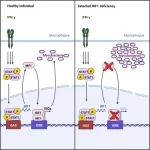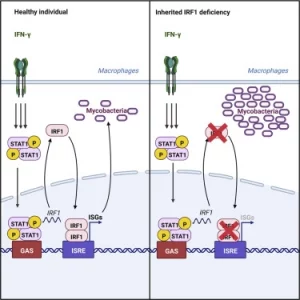According to a recent study, the immune system defends the body from pathogens that are known to cause serious illnesses like COVID-19 and tuberculosis (Figure 1). This study, which looked into a rare immunodeficiency, reveals how this happens.
When it comes to defending the body against pathogenic microorganisms that can make people ill, the immune system is essential. A complex network of organs, cells, and proteins make up this system, including IRF1, also known as regulatory factor 1, which is essential for controlling the initiation of an early immune response to pathogens.
IRF1-deficient mice have previously been found to be highly susceptible to a wide variety of viruses. While the patients were highly susceptible to some bacterial infections, the researchers were surprised to discover that they were able to defend themselves normally against viruses, including COVID-19. This was discovered while studying the first human patients with IRF1 deficiency ever identified.
In comparison to the immune response to viruses, this study offers new insight into the mechanisms underlying human immune responses to mycobacteria, which includes pathogens known to cause tuberculosis. We demonstrate that human antiviral immunity is not dependent on IRF1 activity, in contrast to mouse antiviral immunity.
On the basis of their research, it may be possible to develop therapeutic approaches to inhibit or stimulate IRF1 activity and regulate the nature and potency of immune responses. The results improved our knowledge of the specificity and selectivity of our immune responses to various pathogens.
Journal article: Rosain, J., et al., 2023. Human IRF1 governs macrophagic IFN-γ immunity to mycobacteria. Cell.
Summary by Stefan Botha

